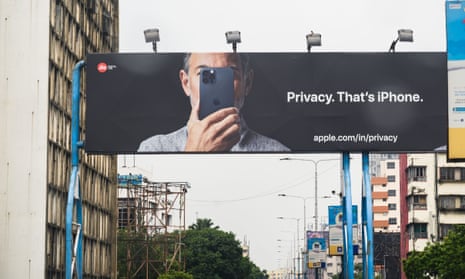Privacy. That’s (no longer) iPhone.
Apple, which has spent big bucks on ad campaigns boasting about how much it values its users privacy, is about to start poking through all your text messages and photos. Don’t worry, the tech company has assured everyone, the prying is for purely benevolent purposes. On Thursday Apple announced a new set of “protection for children” features that will look through US iPhones for images of child abuse. One of these features is a tool called neuralMatch, which will scan photo libraries to see if they contain anything that matches a database of known child abuse imagery. Another feature, which parents can enable or disable, scans iMessage images sent or received by accounts that belong to a minor. It will then notify the parents when a child receives sexually explicit imagery.
On the surface Apple’s new features sound both sensible and commendable. Technology-facilitated child sexual exploitation is an enormous problem; one that’s spiralling out of control. In 1998 there were more than 3,000 reports of child sex abuse imagery, according to a 2019 paper published in conjunction with the National Center for Missing and Exploited Children. In 2018 there were 18.4m. These reports included more than 45m images and videos that were flagged as child sexual abuse. Technology companies have a duty to curb the terrible abuses their platforms help facilitate. Apple’s new features are an attempt to do just that.
But while Apple’s attempts to protect children may be valiant, they also open a Pandora’s box of privacy and surveillance issues. Of particular concern to security researchers and privacy activists is the fact that this new feature doesn’t just look at images stored on the cloud; it scans users’ devices without their consent. Essentially that means there’s now a sort of “backdoor” into an individual’s iPhone, one which has the potential to grow wider and wider. The Electronic Frontier Foundation (EFF), an online civil liberties advocacy group, warns that “all it would take to widen the narrow backdoor that Apple is building is an expansion of the machine learning parameters to look for additional types of content … That’s not a slippery slope; that’s a fully built system just waiting for external pressure to make the slightest change.” You can imagine, for example, how certain countries might pressure Apple to scan for anti-government messages or LGBTQ content.
Jillian York, the author of a new book about how surveillance capitalism affects free speech, is also concerned that Apple’s new parental controls mean images shared between two minors could be non-consensually shared with one of their parents. “This strikes me as assumptive of two things,” she told me. “One, That adults can be trusted with these images and two, that every other culture has the same ideas about what constitutes nudity and sexuality as the US does.”
Edward Snowden, who knows a thing or two about abuses of surveillance, has also voiced concerns about Apple’s new features. “No matter how well-intentioned, @Apple is rolling out mass surveillance to the entire world with this,” Snowden tweeted. “Make no mistake: if they can scan for kiddie porn today, they can scan for anything tomorrow. They turned a trillion dollars of devices into iNarcs–*without asking.*”
But why would a technology company bother asking the public what it wants? We all know that big tech knows what’s best for us plebs. While mass surveillance may sound scary, I’m sure we can all trust Apple et al. to do the right thing. No need to worry about hackers or Apple contractors accessing and uploading your nudes! No need to worry about Apple employees exploiting the technology to spy on people, in the same way that Uber employees did with their “God View” tool! I’m sure it will all be perfectly fine.
Facebook cracks down on discussing ‘hoes’ in gardening group
While we’re on the topic of tech companies policing inappropriate content …Facebook’s state-of-the-art technology recently censured a New York gardening group for using the word “hoe”. This wasn’t the first time Facebook has had trouble with the word – as residents of Plymouth Hoe in the UK know all too well.
Indonesia army will end ‘virginity test’ for female recruits
The (highly unscientific) procedure was known as the “two-finger test” because doctors would probe a potential recruit’s vagina to check if her hymen was intact. If the doctor decided you weren’t a virgin you wouldn’t get into the army. While it may seem mindboggling that Indonesia is only now banning this barbaric practice, virginity testing is a lot more widespread than you might think – it’s still legal in certain parts of the United States.
Chinese state media describes Olympic medalist as a ‘manly woman’
The state channel CCTV also asked Gong Lijiao, who won gold in the women’s shot put, if she had plans for a “woman’s life.” What does that mean exactly? Losing weight, getting married and having kids, obviously.
If Cuomo had any self-respect, he’d resign
The New York attorney general’s office released damning a 165-page report on Tuesday that determined Andrew Cuomo had illegally abused and harassed women subordinates. Despite widespread calls for him to resign, Cuomo is still stubbornly clinging to power. The governor is “reckless, disrespectful, misogynist and allergic to taking responsibility,” Moira Donegan writes. “He has demonstrated not merely an unfitness for power but a personal moral vacuity – an unwillingness to think of other people, of women, as equals, or to imagine his own actions as having consequences.”
“Gritty paternalism was the political brand Mr. Cuomo had been building his whole career, an image shrewdly forged in a blend of aggressive masculinity and performed compassion,” Ginia Bellafante writes in the New York Times. Voters keep electing men like this because we’ve been trained to believe that’s what good leadership looks like. However, as Cuomo proves, posturing a “tough guy” isn’t the same as being a good leader. (Funnily enough, I’ve written a book all about this – and how we desperately need to embrace a more ‘feminine’ model of leadership – which is now available for pre-order!).
The week in patty-archy
A Russian woman has reportedly sued McDonald’s after a tempting cheeseburger commercial made her break her fast during Lent. “When I saw an advertising banner – I could not help myself,” the woman complained. She is asking the fast food chain to compensate her for moral damage in the amount of 1,000 rubles ($14).

